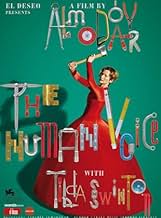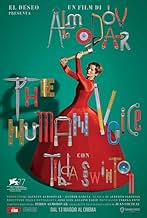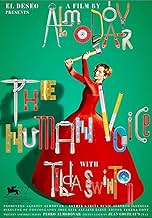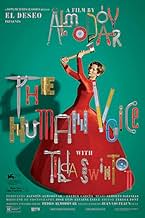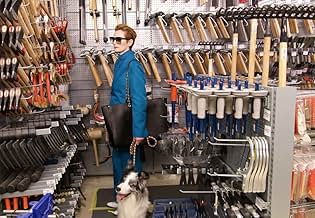PUNTUACIÓN EN IMDb
6,8/10
9,7 mil
TU PUNTUACIÓN
Añade un argumento en tu idiomaA woman watches time passing next to the suitcases of her ex-lover (who is supposed to come pick them up, but never arrives) and a restless dog who doesn't understand that his master has aba... Leer todoA woman watches time passing next to the suitcases of her ex-lover (who is supposed to come pick them up, but never arrives) and a restless dog who doesn't understand that his master has abandoned him. Two living beings facing abandonment.A woman watches time passing next to the suitcases of her ex-lover (who is supposed to come pick them up, but never arrives) and a restless dog who doesn't understand that his master has abandoned him. Two living beings facing abandonment.
- Dirección
- Guión
- Reparto principal
Reseñas destacadas
'The Human Voice (2020)' is a short film based around Jean Cocteau's play of the same name. It's directed by Pedro Almodóvar (his English-language debut) and stars Tilda Swinton as pretty much the only on-screen character (there are some background extras towards the start, but that's about it). It's a very pared-down affair, not just within its story but also within its presentation. Though it's colourful and sometimes lavish, it doesn't have the same, shall I say, 'high-calibre melodrama' feel that much of the famous director's work has. Instead, it draws as much attention to its focal performance as possible, the film taking a backseat to its subject. This isn't necessarily a bad thing, even if it runs the risk of making the flick's central monologue become a little monotonous, as it draws attention to the main reason the thing exists in the first place. In many ways, the short feels purely like a vehicle for Swinton to flex her acting muscles. The actual story isn't all that impactful and it's only as interesting as it is (it never gets boring) because it's performed so utterly well. Ultimately, however, the flick comes across as a little hollow. It's entertaining enough for what it is, but it doesn't have much staying power and it isn't actually all that compelling. It isn't bad, don't get me wrong. It's just a very, I suppose, 'in-one-ear-and-out-the-other' kind of thing. Still, it's worth a watch if you're a fan of its director, star or source material (which, incidentally, bears some similarities with 'Women On The Verge Of A Nervous Breakdown (1988)', since Almodóvar has been inspired by Cocteau's work for quite some time). 6/10.
One thing I noticed, and adored, about Almodóvar, is that despite his unequivocal propensity for incorporating comedy with melodrama, there's no way his films could come across as either silly or overly sentimental. For his stories are laced with considerable nuance. His Women on the Verge on a Nervous Breakdown, which is also based on Jean Cocteau's play, "La voix humaine" as this short is, maintains an incremental humorous tone so much so it could be adequately described, by its end, as a farce. Yet, as we see Pepa trying to figure out why her lover dumped her without an explanation, Almodóvar delves into Pepa's psyche with great subtlety that's apt for her precarious state. That's why I thought The Human Voice would benefit greatly from the concentrated nature of short films. Our unnamed protagonist's wait for three days for her lover to come in a last chance to see him has filled her with rage. A vindictive rage almost identical to that of The Bride in Kill Bill, but she still loves him. So she acts out like a maniac: stabbing one of her lover's suits with an axe in a harmless cathartic release. She wouldn't dare to actually hurt him; she still loves him. Therefore, she's so vulnerable. Over the course of her conversation with his lover, her seemingly stable and wry demeanour gradually crumbles, exposing both her helplessness and her futile undirected rage. Almodóvar brilliantly highlights such contradiction and lays her feelings bare by showing the soundstage her exuberantly furnished, sumptuously coloured apartment is constructed upon. As she grows more desperate, she begins to lose control. Finally, she decides to free herself from the submissive woman she's always been, and put an end to their toxic relationship - after all, her love made her too fragile and delicate to venture to turn the tables on him as Alma did on Reynolds in Phantom Thread. The thing is, I didn't feel that she loves him. What's baffling is that I can't put my finger on why exactly I feel so, but it's likely due to the stagy feel this film has. It is a showcase of Tilda Swinton's thespian prowess, but, at times, her monologue comes off rather like a soliloquy - like there's no one on the other side of the phone line. Regardless, The Human Voice is an eye-popping, exquisitely-made feminist work with witty sarcastic undertones.
This has quite a lot to live up to. The 1966 version with Bergman is a masterpiece. Plus this is directed by Pedro Almodóvar AND it's his first English language film. I've been itching to see this for a long time. Delayed like many films due to the pandemic, my expectations have been heightened. Always dangerous going into a film. This was interestingly shot during lockdown, behind the scenes shots showing the crew in masks. I suppose this might be the perfect film project for social distancing. In place of Bergman is Tilda Swinton. She's not in the same intimate setting as her predecessor. In fact she's a lot more freedom, starting browsing axes in a hardware store. The premise is the same though. An unnamed woman, alone after being left by her lover. Only a dog for company. Even here though, things are dialled up, the dog can act! Also pining for the now missing man, seriously the dog is great! What's also great is her apartment. It's gorgeous! Modern clean lines, bold colours. It screams taste and control. Inexplicably though, it's not shown to be a real apartment. It's a set, built in a warehouse-like sound stage. I've not yet decided why, other than it looks wonderful as we see aerial shots, Swinton moving from room to roofless room smashing things in anger and frustration. We're a third way in before the phone rings. This time an iPhone with AirPods. Here we get closer to Bergman's portrayal. The monologue taking centre stage as Swinton wanders in and out of hers. It's a much more stylised interpretation and feels a little soulless in places for it, but it still works. The relationship described is much more modern, less traditional, less conservative, but the emotions are just as raw and Swinton delivers with just as effective might. Is it better than the 1966 version? No, but I think it might be as good, or very very close. I might need to watch it a few times to appreciate it fully. Swinton though is undoubtably brilliant and Almodóvar has updated the premise with all the invention you'd expect. It might even have a better ending. My expectations were high and I wasn't disappointed.
The dog is identified in the film credits at the end, but oddly not here - his name is Dash. And he does a great job.
A mature woman (Tilda Swinton) watches time passing next to the suitcases of her ex-lover -who is supposed to come pick them up, but never arrives- and a restless dog who doesn't understand that his master has abandoned him. The woman at first speaks calmly, but once the conversation goes on, things get worse, and anger and a certain hysteria emerge from her mouth. We watch two living beings facing abandonment.
Almodóvar presents his first film entirely in English, a 30-minute short film with the absolute leading role of the great Tilda and dealing with heartbreak as a backdrop, a torn monologue based on Cocteau's play, in which the author Frances showed the sadness, the rage, the helplessness, the helplessness and a thousand other emotions of a love breakup. In which the long-time British actress shows a whole catalog of feelings through a telephone conversation in which the other party cannot be heard. This prestigious British actress of androgynous beauty has a notorious career. She has played both women and men. She doesn't always play women; she has played Mozart on stage, an Elizabethan nobleman in Orlando (1992) and an androgynous angel, Gabriel, in Constantine (2005). Tilda Swinton is a frequent collaborator of Luca Guadagnino with whom she has worked in five productions: The Protagonists (1999), Tilda Swinton: The Love Factory (2002), Io sono l'amore (2009), A bigger splash (2015) and Suspiria (2018), together they also created the concept of the short film Here (2012).
Also worth highlighting is the excellent work of two of Almodovar's regular collaborators: cameraman José Luis Alcaine in the photography and the Oscarized composer Alberto Iglesias in music. Being a project produced by Pedro Almodovar himself y his brother Agustin Almodovar, the latter has a bit role as a shopkeeper. Later on, Pedro would make a second short film in English: Extraña forma de vida (Strange Way of Life) with Ethan Hawke and Pedro Pascal. Previously Pedro Almodóvar had directed successful films, some of them Oscar-winning, among which the following can be highlighted: Dolor y gloria, La piel que habito, Hable con ella, Carne trémula, Tacones lejanos, Átame, La Flor de mi secreto, Mujeres al borde de un ataque de nervios, La Ley del Deseo.
Almodóvar presents his first film entirely in English, a 30-minute short film with the absolute leading role of the great Tilda and dealing with heartbreak as a backdrop, a torn monologue based on Cocteau's play, in which the author Frances showed the sadness, the rage, the helplessness, the helplessness and a thousand other emotions of a love breakup. In which the long-time British actress shows a whole catalog of feelings through a telephone conversation in which the other party cannot be heard. This prestigious British actress of androgynous beauty has a notorious career. She has played both women and men. She doesn't always play women; she has played Mozart on stage, an Elizabethan nobleman in Orlando (1992) and an androgynous angel, Gabriel, in Constantine (2005). Tilda Swinton is a frequent collaborator of Luca Guadagnino with whom she has worked in five productions: The Protagonists (1999), Tilda Swinton: The Love Factory (2002), Io sono l'amore (2009), A bigger splash (2015) and Suspiria (2018), together they also created the concept of the short film Here (2012).
Also worth highlighting is the excellent work of two of Almodovar's regular collaborators: cameraman José Luis Alcaine in the photography and the Oscarized composer Alberto Iglesias in music. Being a project produced by Pedro Almodovar himself y his brother Agustin Almodovar, the latter has a bit role as a shopkeeper. Later on, Pedro would make a second short film in English: Extraña forma de vida (Strange Way of Life) with Ethan Hawke and Pedro Pascal. Previously Pedro Almodóvar had directed successful films, some of them Oscar-winning, among which the following can be highlighted: Dolor y gloria, La piel que habito, Hable con ella, Carne trémula, Tacones lejanos, Átame, La Flor de mi secreto, Mujeres al borde de un ataque de nervios, La Ley del Deseo.
¿Sabías que...?
- CuriosidadesThis is Pedro Almodóvar's first film in English.
- ConexionesFeatured in Projector @ LFF: One Night in Miami/The Human Voice (2020)
Selecciones populares
Inicia sesión para calificar y añadir a tu lista para recibir recomendaciones personalizadas
Detalles
Taquilla
- Recaudación en todo el mundo
- 164.623 US$
- Duración
- 30min
- Color
- Mezcla de sonido
- Relación de aspecto
- 1.85 : 1
Contribuir a esta página
Sugerir un cambio o añadir el contenido que falta

![Ver Tráiler [OV]](https://m.media-amazon.com/images/M/MV5BYzQyNTRjNDMtMDU3MS00M2M2LWIwMDQtYThjNTllZmE2ZWQ2XkEyXkFqcGdeQXRyYW5zY29kZS13b3JrZmxvdw@@._V1_QL75_UX500_CR0)


